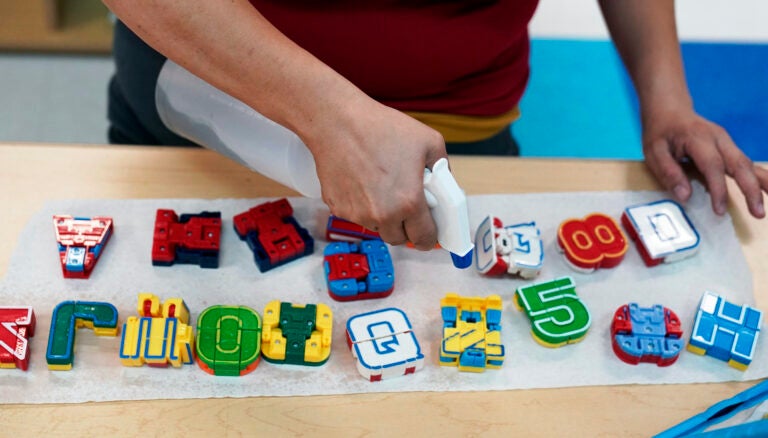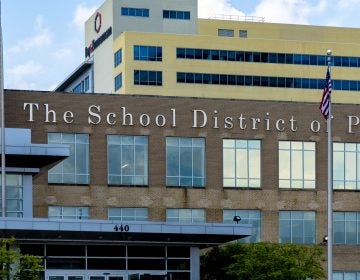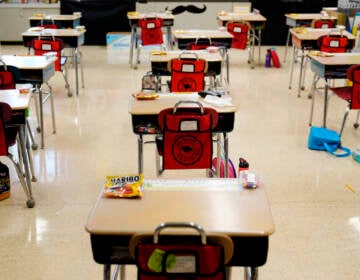Rural schools need help to make remote learning accessible to all
Countless children in small towns across are being robbed of their right to learn and develop, writes Edward Albert of the Pennsylvania Association of Rural and Small Schools.

Pre-k teacher Monica Alvarez cleans and disinfects teaching tools as she prepares her classroom, Thursday, Aug. 13, 2020, in San Antonio. (AP Photo/Eric Gay)
As the long, dark COVID-filled months stretch before us, and as schools scramble to respond to the latest curve balls thrown by the pandemic, the U.S. government must fully address the threats our school districts face moving forward. An unprecedented educational catastrophe is looming and will jeopardize our children’s future success, and thus the success of our country, if no countermeasures are taken.
I think I speak for all Pennsylvanians when I say the health and safety of students, teachers, and staff is paramount. And our schools have been working hard to innovate new ways to protect their children and staff while still providing the best education possible. Of course, with positive COVID-19 cases continuing to mount and people being encouraged to stay home as much as they can, many schools are beginning to rely more and more on remote learning — which has been riddled with challenges, especially for rural schools in cash-strapped counties. Many teachers and administrators in these counties have found it particularly difficult to meet the needs of all of their students via technology alone without the resources they so desperately need.
When fewer people are working or able to pay their bills, this means fewer tax dollars are flowing into school coffers. While it is correct that Harrisburg was able to maintain level state funding for school districts in November with the help of the federal CARES Act, the local share of funding used to support schools has been pummeled by the recession. And when you take into account an additional $350 million from school districts’ budgets to pay for increased enrollment at cyber charter schools, the cost of additional safety precautions to protect students during in-school instruction, and the need to support students stranded at home with inadequate computers, WIFI, software, or other technology required to learn remotely, we have an extraordinary educational crisis on our hands.
Many schools, especially poorer rural ones, were underfunded before the pandemic hit. Now, they have been disproportionately affected by COVID-19 as the local revenues of wealthier districts have been sustained and their students are already well-equipped with technology for remote learning. This will only serve to intensify existing educational disparities in the years to come.
If children must stay home to protect public health, then Washington must take immediate action to get school districts the resources they need so that children can learn at home effectively. If children are able to continue learning in person, or as part of a hybrid system, schools face increased costs to make sure that happens safely. As it stands right now, countless children in small towns across the state are being robbed of their right to learn and develop the abilities they will need to achieve their dreams, despite their teachers going above and beyond to help them.
As for Harrisburg lawmakers, when they begin deliberating the next state budget in early 2021, they need to find a permanent solution to fairly fund our schools, in both the post-COVID short-term and beyond. Pennsylvania has faced a longstanding, multi-billion-dollar school funding shortfall for years. It’s now time for them to find a long-term funding solution that fairly invests in all of our students and presents them with equal opportunities.
As an education professional with nearly 40 years of experience, I have never seen a set of circumstances impact public education the way COVID-19 has. We now find ourselves at a crossroads where both sides of the aisle will either rally together to save our children’s education or do nothing and utterly fail them. Our children have already suffered nearly six months of half-baked learning due to insufficient resources. If nothing changes, they will have lost a full year — a year they will never get back.
___
Dr. Edward Albert has been in education for over 40 years and currently serves as the executive director of the Pennsylvania Association of Rural and Small Schools.
 WHYY is one of over 20 news organizations producing Broke in Philly, a collaborative reporting project on solutions to poverty and the city’s push towards economic justice. Follow us at @BrokeInPhilly.
WHYY is one of over 20 news organizations producing Broke in Philly, a collaborative reporting project on solutions to poverty and the city’s push towards economic justice. Follow us at @BrokeInPhilly.
WHYY is your source for fact-based, in-depth journalism and information. As a nonprofit organization, we rely on financial support from readers like you. Please give today.



![CoronavirusPandemic_1024x512[1]](https://whyy.org/wp-content/uploads/2020/03/CoronavirusPandemic_1024x5121-300x150.jpg)


